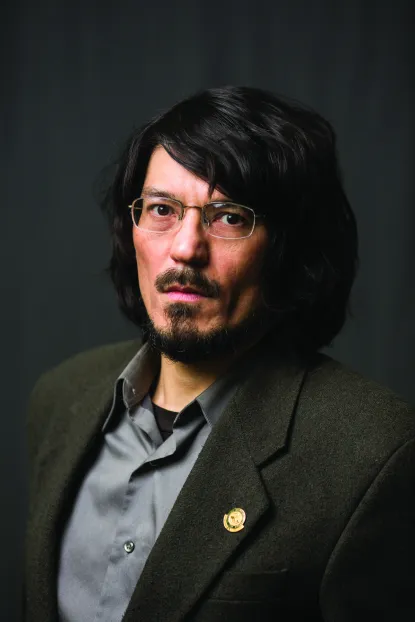
Cutting Edge Technology. Literally.
How can an algorithm decrease use of natural resources and increase company profits?
Physics professor Jeffrey Horn invented a Deep-Scale Evolution (DSE) algorithm that has practical implications for minimizing material waste in industrial production.
“We plan to bring DSE to bear on the real-world shape nesting problems in industry,” said Horn. “Businesses such as automotive manufacturing, textiles and sign making all involve cutting out shaped pieces from a sheet of expensive material, such as steel, glass, leather or titanium. The act of cutting these materials is done by nesting the cutouts close together in an effort to reduce the wasted trim. So DSE maximizes the material usage."
Horn was awarded $92,500 from the Michigan Translational Research and Commercialization (MTRAC) Innovation Hub for Advanced Computing for his next-generation computing project, which also involves NMU computer science graduate students Nathan Joyal '21 BS, Xavier Mansfield '20 BS, '22 MS and Oliver Rochester '21 BS, and computer science undergraduate Jonathon Damon, as technical implementers. Engineering Technology Professor Cale Polkinghorne '05 BS, '08 MAE, '10 EdS is serving as a pilot user and tester.
“This kind of research and development work requires graduate-level capabilities and would not have been possible without our new program.
“I'm grateful for the efforts of the computer science faculty, under the leadership of Dr. Hadi Shafei, to establish our computer science graduate program this year—just in time for the MTRAC project,” Horn said.
“Our specific goal is the development and deployment of DSE on a powerful server specially designed to run DSE with massive population sizes yet short computation times. To do this, we'll take advantage of the latest revolution in processing power—the graphics processing unit or GPU—originally developed to render 3D graphics for games and animations but now used for massively parallel algorithms, like Deep Learning, Bitcoin mining, and simulated evolution like DSE.”
Horn's project was one of four at state universities chosen by the MTRAC Innovation Hub for Advanced Computing Technologies. All aim to tackle deep tech opportunities in high-impact sectors, such as anti-deep fake technology, AI-based decision support and next-generation computing. In addition to funding, the researchers receive mentorship support from MTRAC committee members composed of leading technologists, tech entrepreneurs, industry partners and venture capitalists.
The MTRAC program offered additional funding to Horn, bumping up his original budget of $75,000 in “an unusual expression of confidence in the project's approach,” he said. The increase will enable Horn to expand the project team with marketing and customer discovery expertise and bring the technology to market sooner.
